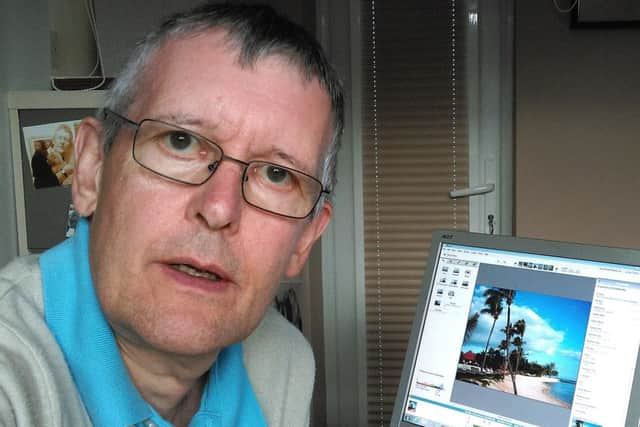Why it's time to stop feeling ashamed about depression


Winston Churchill famously referred to his “black dog” of depression, but, 51 years after his death, the sense of shame and embarrassment felt by countless fellow-sufferers shows no sign of abating.
And, to add insult to injury, that’s despite the fact that one in four or five of us is a victim of poor mental health at any stage of our lives.
Advertisement
Hide AdAdvertisement
Hide AdI’ve suffered badly from anxiety and depression since childhood - I’m now 65 - and am still struggling to understand what triggers an episode that can, at worst, lead to thoughts of suicide and, at best, make everyday survival a struggle.


The fact that my (largely) hidden symptoms are shared by so many people is of little consolation when dark clouds descend.
And I don’t need to recall the high percentage of patients clogging up our GP surgeries who, outwardly, have physical ailments but, in truth, are probably enduring the same mental torture as those sitting on either side.
So why am I being so candid about this still-little-understood phenomenon that blights millions of us nationwide?
Advertisement
Hide AdAdvertisement
Hide AdAlthough I spent most of my working life as a daily newspaper journalist, followed by almost 10 years as a volunteer with the Citizens’ Advice Bureau in the East Riding of Yorkshire, I was ill-equipped to cope with these stress-ridden roles.


Starting off a reporting or advising shift with the aid of headache-numbing painkillers and indigestion remedies rang alarm bells, of course, and a resting pulse rate of 100 beats per minute or more was another indication that I was in a bleak place that Sir Winston would have recognised only too well.
I’m open about confronting my battles with poor mental health, but it says everything about the condition that I almost used the words “admitting” or “confessing” as though it’s a sign of weakness, a self-inflicted put-down indicating a lack of self-respect.
But that unanswered query still needs addressing.
Why is it viewed as embarrassing to tell everyone that “I can’t deal with life”? Perhaps it’s because there are usually no tell-tale signs to “prove” the condition is real, unlike the case with a broken arm, a nose bleed or suchlike, and there’s always the suspicion that he or she is fabricating the illness to elicit sympathy, to miss the day at work or to explain the perceived failure in a mundane task or situation.
Advertisement
Hide AdAdvertisement
Hide AdI’ve suffered from all the classic symptoms, including a rapid heart beat, raised blood pressure, pounding head, confusion, dizziness, trembling legs, palpitations and stomach upset, but they remain largely hidden from the casual observer.
Psychosomatic disorders, eh? Their symptoms are genuine all right. It’s just that there’s no solid, visible evidence produced by the sufferer to convince the person hearing the complaint - perhaps for the millionth time - that he or she is genuinely unwell.
I don’t believe that I’ve ever concealed the extent of my poor mental health, which I’ve discussed over the decades with psychiatrists, family doctors and counsellors, but bringing up the subject in a workplace, family or social setting has never been easy.
Nevertheless, I always emphasise that I’ve been prescribed anti-depressants, that I’ll probably be taking them until the day I die and that, when I experience a particularly distressing episode, I can’t believe that I will ever feel “normal” again.
Advertisement
Hide AdAdvertisement
Hide AdI also point out that suicide among young men in Britain accounts for more deaths than cancer, stroke and other “physical” ailments put together.
So why am I writing this now? It’s because the nation is experiencing an epidemic of depression and other “mind” problems that equates to suffering on a colossal scale.
The suicide earlier this year of Yorkshire-born progressive-rock keyboard legend Keith Emerson, whose playing abilities were hampered by poor bodily and emotional health, highlighted the tip of this never-melting iceberg.
And then there was the death of renowned writer and “agony aunt” Sally Brampton, again by her own hands, whose passing reinforced my plea for openness when dealing with this most disturbing of everyday conditions.
Advertisement
Hide AdAdvertisement
Hide AdGardening expert Monty Don, footballer Clarke Carlisle, singer Leonard Cohen and actor Stephen Fry are but four of the many “celebrities” to have spoken publicly about their depression, as has Labour’s former spokesman, Alastair Campbell, whose recently-deceased brother, Donald, had schizophrenia. Alastair is an ambassador for Time to Change, a campaign which aims to end mental health discrimination in the workplace.
In the past two months I’ve heard about five friends and acquaintances who’ve finally sought help in tackling their own personal demons.
They are representative of society as a whole - a teacher, a builder, an unemployed history graduate, a farm worker and a doctor - and, to a lesser or greater extent, they blame themselves for their predicament. I was taken by surprise when one of these particular individuals whispered to me that he’d been absent from work “because I’ve got your problem”. Prostate gland enlargement or a hiatus hernia, perhaps? Kidney stones?
“No,” he said. “You know. That other thing. That clinical thing you’ve sometimes talked about. I’m on tablets for it.”
Advertisement
Hide AdAdvertisement
Hide AdDepression. The word that dare not speak its name or its mind.
Well, it’s time it did. For me and for the countless other people whose “secrets” should be shared with everyone.
So, please, please, please, I implore you all to “mind out” for mental health disease because, sooner or later, you could be the next one to catch it. And, as the saying goes, a problem shared...
World Mental Health Day
The World Health Organisation recognises World Mental Health Day on 10 October every year as an opportunity to raise “awareness of mental health issues around the world and mobilising efforts in support of mental health.”
Advertisement
Hide AdAdvertisement
Hide AdThe theme for this year’s World Mental Health Day, set by the World Federation for Mental Health, is psychological first aid and the support people can provide to those in distress.
Where to get help
Numerous charities provide help and support for people with mental health problems:
www.sane.org.uk
www.mind.org.uk
www.samaritans.org
www.anxietyuk.org.uk
www.rethink.org